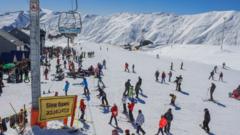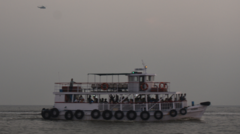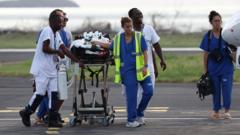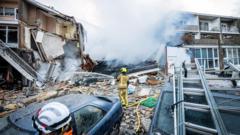Authorities discovered the victims in a sleeping area above a restaurant, and investigations suggest the event was accidental, without any indications of foul play. Gudauri, celebrated as the largest ski resort in Georgia, has now become the site of a tragic reminder of the potential hazards associated with heating systems in enclosed spaces.
Tragic Carbon Monoxide Incident Claims Twelve Lives at Georgia's Gudauri Ski Resort

Tragic Carbon Monoxide Incident Claims Twelve Lives at Georgia's Gudauri Ski Resort
Twelve individuals, including eleven foreigners and one Georgian, succumbed to carbon monoxide poisoning in a disturbing incident at one of Georgia's premier ski destinations.
In a somber twist to the festive ski season, the ski resort has drawn attention not only for its breathtaking slopes but also for this unfortunate accident that raises awareness about safety protocols in winter sports destinations.
The authorities are continuing their investigation into the incident, urging for enhanced safety measures to prevent similar tragedies in the future.
This tragedy highlights the importance of vigilance regarding carbon monoxide exposure, especially in climates where heating sources are vital for survival. Observers are now calling for stricter regulations at ski resorts to ensure the safety of visitors, as carbon monoxide is a silent killer that can lead to devastating outcomes, particularly in enclosed spaces without adequate ventilation.
Discussions surrounding the incident also emphasize the need for comprehensive safety training for staff in the hospitality industry, particularly in popular tourist regions like Gudauri, which attract thousands of visitors annually.
The grieving families of the deceased victims, along with the local community, are left to mourn while also questioning what can be done to ensure that future ski seasons are free from such poignant tragedies.
The Georgian authorities, along with safety experts, are expected to review existing protocols at ski resorts to mitigate any future risks posed by carbon monoxide and similar hazards, aiming to restore a sense of security for tourists and residents alike.
As Gudauri's reputation as a prime ski destination faces scrutiny, the global ski community awaits developments on regulatory measures, hoping for reform to protect the health and safety of all skiers and winter sports aficionados.
With the winter tourist season still underway, this incident serves as a stark reminder of the inherent risks associated with skiing and winter recreation, stressing the importance of vigilance and preparedness in the face of unforeseen dangers.
In sum, the Gudauri carbon monoxide incident sheds light on both the immediate tragic loss of lives and the broader implications for ski resort safety standards, calling for a much-needed reevaluation of protocols to safeguard the well-being of guests in such recreational venues.
The authorities are continuing their investigation into the incident, urging for enhanced safety measures to prevent similar tragedies in the future.
This tragedy highlights the importance of vigilance regarding carbon monoxide exposure, especially in climates where heating sources are vital for survival. Observers are now calling for stricter regulations at ski resorts to ensure the safety of visitors, as carbon monoxide is a silent killer that can lead to devastating outcomes, particularly in enclosed spaces without adequate ventilation.
Discussions surrounding the incident also emphasize the need for comprehensive safety training for staff in the hospitality industry, particularly in popular tourist regions like Gudauri, which attract thousands of visitors annually.
The grieving families of the deceased victims, along with the local community, are left to mourn while also questioning what can be done to ensure that future ski seasons are free from such poignant tragedies.
The Georgian authorities, along with safety experts, are expected to review existing protocols at ski resorts to mitigate any future risks posed by carbon monoxide and similar hazards, aiming to restore a sense of security for tourists and residents alike.
As Gudauri's reputation as a prime ski destination faces scrutiny, the global ski community awaits developments on regulatory measures, hoping for reform to protect the health and safety of all skiers and winter sports aficionados.
With the winter tourist season still underway, this incident serves as a stark reminder of the inherent risks associated with skiing and winter recreation, stressing the importance of vigilance and preparedness in the face of unforeseen dangers.
In sum, the Gudauri carbon monoxide incident sheds light on both the immediate tragic loss of lives and the broader implications for ski resort safety standards, calling for a much-needed reevaluation of protocols to safeguard the well-being of guests in such recreational venues.




















